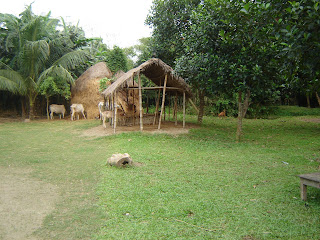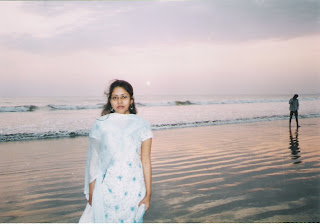Last month Nari Jibon project celebrated its third birthday. In 2005 three fullbright fellows and a few Bangladeshi staffs set up Nari Jibon and started low cost classes in Bangla, English, computers and tailoring to provide alternative skills to disadvantaged urban women in Dhaka, Bangladesh.
 Since June 2007 with the help of a micro grant from Rising Voices Nari Jibon started teaching blogging, digital photography, and video blogging by incorporating new media assignments into their existing English, computer, and Bangla classes. We hope you have already listened to a live interview with Nari Jibon founder Kathryn Ward from WBDX’s Big Muddy radio program in Carbondale, Illinois, which was featured in Rising Voices last month. In this interview Ms. Ward described how Nari Jibon gave women in Dhaka, Bangladesh a stronger voice.
Since June 2007 with the help of a micro grant from Rising Voices Nari Jibon started teaching blogging, digital photography, and video blogging by incorporating new media assignments into their existing English, computer, and Bangla classes. We hope you have already listened to a live interview with Nari Jibon founder Kathryn Ward from WBDX’s Big Muddy radio program in Carbondale, Illinois, which was featured in Rising Voices last month. In this interview Ms. Ward described how Nari Jibon gave women in Dhaka, Bangladesh a stronger voice.
Due to unusual electricity blackouts from a recent heatwave across the country the power supply inverters of the PCs in the lab were not charged well. So it slowed writing and posting of the articles by Nari Jibon particpants in their two blogs “Bangladesh from our view” [en] and “Amader Kotha (Our voices)” [bn].
Here are some snippets of what they have been talking about.
Mohtarimun Nahar Bipa tells:
In our country Pitha [home made cake] is a traditional food item. Different types of Pitha are made throughout the year in Bangladesh. But the winter season is the best season for making and having Pitha. To me the best time to have Pitha is in the winter morning.
Learn more about Pitha from her post. Also take a look at this video which shows how pithas are made:
Mohtarimun Nahar [Bipa] also posts photos of her village Digrirchor situated near the India – Bangladesh border.

Here is a video of her village showing the rice fields, greeneries, ponds and farmers at work, a typical sight of Bangladeshi village which is beautiful and pollution free than the urban cities.
Irin Sultana wrote about her study tour in Chittagong, the port city of Bangladesh. She also went to Cox's Bazaar which is claimed to be the world's longest natural sand sea beach (120 km) including mud flats.

Jannatul Ferdoush discusses about the workers in the clothing industry of Bangladesh where almost 90% of the work force are women. She points out the difficulties they face and their struggles:
Garments workers’ life is very difficult. They wake up every early morning. At first they are to finish their household works. After that they go out to attend their work. They walk a long way to attend their work. Women workers face many problems. They are to maintain both their family and professional life at a time.
Bangladesh earns million of dollars from foreign countries for these garment workers. But workers don't get the real respect like other people. We should respect them. These workers are the most important part of our country.
She also discusses the lives of poor people in Bangladesh and recognizes that despite being poor they are very kind and well hearted.
In the Bangla Blog Sufiya Khatun writes about a scary journey on an overcrowded river launch (large motor boat) to cross one of the wide rivers of Bangladesh. She almost fell into the river due to a stampede among a large crowd to get to the only available boat.
কিছু নিয়ম-শৃঙ্খলার অভাবে মানুষের জীবন চলে যাওয়া অথবা মানুষের এই যে হয়রানি এ থেকে মুক্তি পাওয়ার কোন উপায় আছে কি? সরকার এত কিছুর সু-ব্যাবস্থার পদক্ষেপ নিয়েছে কিন্তু সাধারন সু-ব্যাবস্থার অভাবে বড় কিছু ধরনের দুর্ঘটনা ঘটছে। মানুষের যাতায়াত ব্যবস্থার দিকে একটু দৃষ্টি দিলে হয়ত সাধারন মানুষ সস্তি পাবে।
Is their any way to escape from this harassment and risking life because of absence of some rules and discipline? The government has done so much but due to lack of some small rules and regulations in place, big accidents are happening. If these are given priority then the general public can travel at ease.
April 14, 2008 was Pohela Boishakh the first day of the Bengali year 1415. Wishing readers new years greetings Taslima Akter tells a bit about the Bangla New year:
New Year's festivities are closely linked with rural life in Bengal. Usually on Poila Boishakh, the home is thoroughly scrubbed and cleaned; people bathe early in the morning and dress in fine clothes. People from all walks of life wear traditional Bengali attire: young women wear white saris with red borders, and adorn themselves with churi (bangles), ful(flowers), and tip (bindis). Men wear white pajama (pants) or lungi(dhoti/dhuti) (long skirt) and kurta (tunic). Many of town’s people start the day with the traditional breakfast of Panta bhat (rice soaked in water), green chilies, onion, and fried Hilsa fish. They spend much of the day visiting relatives, friends, and neighbors.
Nari Jibon bloggers got together in the Nari Jibon centre and celebrated the Bangla new year by participating in a cultural program.
Bloggers started their programme with Rabindranath Tagore's song that has become the “anthem of Pahela Baishakh”—Esho hey Baishakh, esho, esho (Welcome, O Baishakh, welcome). See more from video:
At the function, Nari Jibon bloggers sang, recited poems, danced and they also acted in short drama.
Here in the video Nari Jibon students/bloggers Feroza Begum Poly and Afroza Akter danced with one Bengali song in the program of Baishakh celebration. The song is about one Bullock cart driver who stalks a girl from the village to get on his cart to marry him. She is not interested. He starts offering her attractive promises to lure her to marry him. The song goes on in a joyful mood with the kinetics of the cart.
Nari Jibon posted more videos of the cultural program. These videos were shot and edited by Taslima Akter who has shown great skills at editing.




4 comments
Taslima is very talented and even with the loading and electrical difficulties Narijibon students manage to publish wonders from Bengladesh.
Very excellent. You have done a great job.